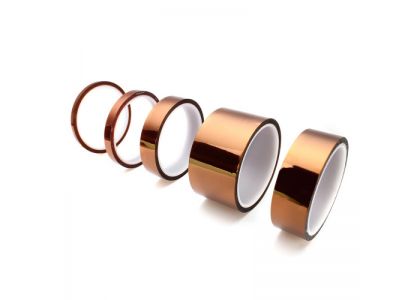
Polyimide tape, often referred to as Kapton tape or PI tape, is a high-performance adhesive material renowned for its outstanding thermal and electrical properties. Used extensively in electronics, aerospace, automotive, and medical industries, its ability to withstand extreme temperatures makes it an essential solution for high-temperature insulation.
Selecting the correct thickness and width is critical to ensuring optimal performance, durability, and cost-effectiveness. This guide will help you understand the available options and how to choose the right polyimide tape manufacturer to meet your specific requirements.
Polyimide tape thickness is measured in mils (1 mil = 0.001 inches). The thickness directly impacts the tape's flexibility, strength, and insulation capacity. Here are the common categories:
Thin Thickness (1–3 mils): Highly flexible and conformable. Ideal for masking, insulating small components, and protecting delicate surfaces.
Medium Thickness (4–7 mils): Balances strength and flexibility. Suitable for general insulation, thermal management, and securing components in electronics.
Thick Thickness (8–15 mils): Provides excellent durability and strength. Perfect for high-temperature insulation in demanding environments, such as aerospace sealing and reinforcing structures.
Width selection determines the tape's coverage area and influences application suitability:
Narrow Width (1/8" – 1/2"): Best for precise insulation, masking, and securing fine components.
Medium Width (1/2" – 1"): Offers a balance between coverage and precision. Used for bundling cables and securing moderate-sized components.
Wide Width (1" – 6"): Ideal for large-scale insulation, sealing, and reinforcement tasks.
Choosing the correct width ensures efficiency and minimizes material waste during application.
Polyimide tapes excel in environments that demand superior heat resistance and electrical insulation. Common applications include:
Aerospace: Protecting sensitive components against high thermal variations.
Electronics: Insulating circuit boards, semiconductor manufacturing.
Medical Devices: Providing insulation in diagnostic and treatment equipment.
Automotive: Bundling and protecting wiring harnesses exposed to elevated engine temperatures.
In all these sectors, using Kapton tape or PI tape ensures reliable performance even under extreme operational conditions.
| Thickness | Width | Best Applications | Typical Industries |
|---|---|---|---|
| 1–3 mils | 1/8" – 1/2" | Delicate masking, fine component insulation | Electronics, Medical |
| 4–7 mils | 1/2" – 1" | General-purpose insulation, cable bundling | Electronics, Automotive |
| 8–15 mils | 1" – 6" | High-temp sealing, structural reinforcement | Aerospace, Industrial |
Choosing a reputable polyimide tape manufacturer is essential to ensure product quality and consistency. A good manufacturer provides:
Wide variety of thickness and width options.
Certified products meeting industry standards (e.g., UL, RoHS compliance).
Expert technical support to help with tape selection based on application needs.
Working with an experienced supplier ensures you receive tape solutions tailored for your operational environment, whether for sensitive electronics or critical high-temperature insulation challenges.
Evaluate the Environment: High temperatures, exposure to chemicals, and mechanical stress levels influence the required tape thickness and width.
Prioritize Quality: Inferior tapes can fail under stress. Ensure the tape is from a recognized polyimide tape manufacturer.
Balance Cost and Performance: Thicker and wider tapes provide more protection but may increase costs. Match the tape to your true operational needs.
Seek Expert Advice: Engage manufacturers or distributors to get technical recommendations based on real-world use cases.
Understanding the range of polyimide tape, Kapton tape, and PI tape options available allows you to select the best combination of thickness and width for reliable, long-term performance in any high-demand application.